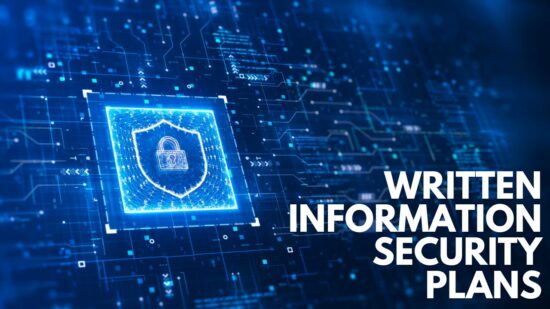Cybersecurity 101: 10 Rules to Live By in 2023
Key Points
- Businesses of all sizes should establish comprehensive security policies while maintaining a secure online environment.
- Having the right security cybersecurity rules in place can help protect your business from potential cyber threats.
- The small things, like using strong passwords, installing antivirus software, and keeping all systems updated, can make a big difference.
In today’s digital world, it’s not a matter of if but when a cyberattack will happen. One accident, like clicking on a phishing link, can result in severe problems like a data breach. With new technologies being introduced every day, it’s up to each business to ensure their data is protected. Protecting your data does not have to be made difficult. Any business can use several simple rules and best practices to help prevent cyberattacks.
Phishing and scam websites are showing up every day, and it can be difficult to tell the difference between a legitimate website and a scam website. However, there are some things you can look out for to protect yourself from falling victim to a fake website:
- Verify the website’s URL. Make sure it belongs to the company or organization it claims to represent.
- Look for spelling and grammatical errors on the website.
- Be cautious of unsolicited emails or text messages that contain links to websites because these may be attempts to redirect you to a fake site
- Be cautious of sites that require too much personal information.
2. Always Use Secure Online Shopping Sites
Online shopping has become a convenient way to purchase anything we can imagine, but with it comes the risk of fraud or theft. To protect yourself and your information, only shop on secure sites. Look for the following clues to make sure you’re using a secure site:
- Look for “https” at the beginning of the website address because it indicates that the site is encrypted and secure.
- Check for a padlock icon in the web browser, which will tell you the site is secure.
- Do not enter sensitive information, such as passwords or credit card numbers, on a site unless you are certain it is legitimate.
- If you have concerns about a website, stay away from it and shop elsewhere or consult with someone you trust to help you identify if it is a safe site.
3. Always Guard Against Phishing Emails
Phishing emails are a common tactic to get you to click on malicious links. To protect yourself and your business, follow these steps when dealing with suspicious emails:
- Don’t open emails from unknown senders.
- Do not click on links in suspicious emails. Check the email’s header to see where it came from and if it looks legitimate.
- Install and regularly update security software on all your devices.
- Make sure everyone within the organization knows how to spot and handle phishing emails.
4. Always Avoid Pop-Ups and Ads
Pop-ups and ads are not only annoying, but they can also lead to viruses and data breaches. Avoiding pop-ups and ads can reduce the risk of becoming the next cyberattack victim. To protect yourself and your business, follow these steps:
- Use a browser extension or ad-blocker.
- Avoid clicking on ads or pop-ups that offer free downloads or that ask you to enter your sensitive information.
- Keep your browser and operating system updated.
- Be careful when visiting unfamiliar websites because they often contain more ads or pop-ups.
5. Always Use Credit Cards Over Debit Cards
When making online purchases, you must always choose the right payment method to ensure the safety of your most sensitive information. One of the best online transaction options is using a credit card instead of a debit card. Here are some reasons why:
- Credit cards have additional layers of security protection that may not be available with debit cards.
- When using debit cards, money can be taken from your account immediately.
- Credit cards are not directly linked to your bank account.
- Credit card companies have customer service teams that monitor suspicious activity.
6. Always Use Different Passwords Across Websites
Using different passwords for different websites is a good security practice. If a bad actor obtains your password for one website, they will not be able to use it to access other accounts. To protect yourself and your information, follow these guidelines:
- Create unique passwords for each website.
- Use a mix of upper and lower case letters, numbers, and special characters.
- Never share your passwords with anyone else.
- If you have trouble remembering all your passwords, consider using a password manager.
7. Always Use Secure Wireless Networks
Using secure wireless networks is important to protect your sensitive information while online. Public wireless networks, like those in a fast food restaurant or airport, are typically insecure and can be vulnerable to cyberattacks. To protect your information while online, follow these steps:
- Only use secure networks that require a username and password to access.
- If you must use an unsecured network, avoid entering sensitive information on any website you visit.
- Always ensure that your computer is updated with the latest security patches.
- Avoid using public computers for online banking or shopping.
8. Make Sure Your Cybersecurity Software Is Always Updated
Keeping your cybersecurity software updated is one of the most important steps to protect yourself from cyberattacks. Outdated software can leave your system vulnerable and exposed to bad actors, so it is important to keep your software up to date. Here are some tips for keeping your cybersecurity software updated:
- Make sure that all your software is up to date with the latest security releases.
- Install security patches and updates as soon as they become available.
- Set up automatic updates for all your devices and software.
- Use a paid version of security software for the best protection because free versions may not offer the same level of protection.
9. Always Monitor Bank Accounts for Suspicious Activities
Monitoring your bank accounts for suspicious activities is another important step in guarding yourself and your business against cyberattacks. Bad actors may attempt to access your accounts, so regularly monitor your accounts for any unauthorized transactions. Here are some tips to help you monitor your accounts:
- Set up alerts for any suspicious activity on your accounts.
- Review account statements regularly to identify any suspicious charges.
- Be aware of phishing emails and other scams targeting your accounts.
- Contact your bank immediately if you suspect fraudulent activity on your account.
10. Avoid Social Media Scams
Scammers often use social media platforms to impersonate legitimate companies or individuals to trick people into giving away their personal information or money. To protect yourself from social media scams, follow these tips:
- Do not respond to messages or posts that are suspicious or appear to be spam.
- Check the legitimacy of any individual or organization you’re interacting with.
- Use privacy settings to limit the amount of personal information you share online.
- If anything seems suspicious, trust your instincts and do not respond.
Final Thoughts
Cybercriminals are always coming up with new ways to exploit any vulnerability. They use social engineering, phishing, ransomware attacks, and more to bypass traditional security measures. Businesses of all sizes should always be on guard about the latest threats and implement the proper security solutions. By implementing and following best practices for cybersecurity, you can protect your business from potential cyberattacks.







